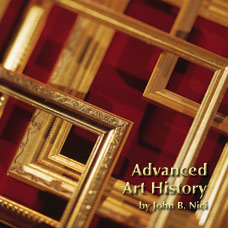Advanced (AP) Art History, updated for current AP curriculum requirements (see table of contents posted below), is a finishing course for many high school students, bringing together math, science, social studies, English and foreign language that spans the school curriculum. The course encourages students to observe objects closely, not only for their aesthetic beauty, but also for what the object reveals about the society, time and culture that produced it. To this end, the student brings with him or her all their travel experiences, cultural background, and knowledge of literature and history to bear on each pertinent object. This synthesis is one of the strengths of teaching a course like this: everyone in the class has something personal to contribute, to explain, to interpret. Students are taught that art analysis is the key to understanding the function works of art play in society. Besides the traditional formal analysis usually taught in art history classes, students will be exposed to new interpretations based on such subjects as context, biographical criticism, and cross-cultural influences. Disciplines such as archeology, curatorship and restoration will be explored as they impact on art historical thought. Students in art history need to know a great many facts about works of art, but equally important they learn to interpret, understand and analyze works that have been considered, or will one day be considered, classics.
Teaching art history has its dangers for the teacher: at times it seems like a mass of facts, civilizations, artists and cultures. The class notes, daily lesson plans, pacing guide and worksheets help to organize all the essential avenues of study, as well as provide activities that clarify artistic trends and expand student horizons. Reaching beyond the likes and dislikes of a student’s taste, an art history teacher knows he or she has found success when a student displays the ability to synthesize artistic currents into a valid interpretation.
The printed or eBook teacher’s edition includes syllabus, pacing guide, detailed daily lesson plans, editable class notes (in PowerPoint form), complete student activity book and editable assessments. Lessons include class notes for lecture support, activities and assignments are designed to engage students in the content while introducing and reviewing essential skills.
The common experience of all advanced art history teachers and perhaps the benchmark of success is a student’s postcard, delivered years later to the school mailbox that reads something like this: “I am standing here in front of the Colosseum in Rome, and I was reminded of your class. I just want to tell you how much…” Advanced Art History is an experience that lasts a student’s lifetime.
Book Review:
Advanced Art History is the best handbook in print for beginning and experienced AP teachers looking for practical help and high-quality classroom materials. John Nici’s publication includes syllabi, a pacing guide, daily lesson plans, class notes, assessments (with keys), a student activities workbook, state standards, and excellent practical advice . . . this book is the best handbook on which to build an AP Art History course that I have ever read, and I have read most of those published. There is no other such handbook in any medium currently in print that can be described as even remotely competitive with Advanced Art History. – Joy Sperling, Chief Reader-designate for AP Art History for the College Board.
Read Full Review Here.
I have had a feeling of impending doom for the last 5 weeks BUT I just received your book from Teaching Point and a wave of relief occurred. First I am down right impressed with the immense amount of work you have put into this course. You truly have laid out detailed lessons that will make my job so much easier. — Ross Grandin, Connectquot High School, NY.
Complete Teacher Manual and Student Book – pricing below
Become highly qualified in this subject (or 100 others) with university credit toward recertification: Click for online courses
Table of Contents
Buying a unit at a time: If you want to purchase one eBook version unit at a time as opposed to the whole course, click on any unit listed below. Otherwise, there are choices listed further below to purchase the entire course. Password: There is a password letter among the files you will receive upon purchase. Note: with the eBook version, this purchase is only for one teacher, your classes, and not for distribution on a school, district or any website, or sharing with any other teacher. You can print all the student material, but teacher materials, for copyright reasons, are screen-view only. You may purchase a printed version of the teacher material from the choices posted below these units.




